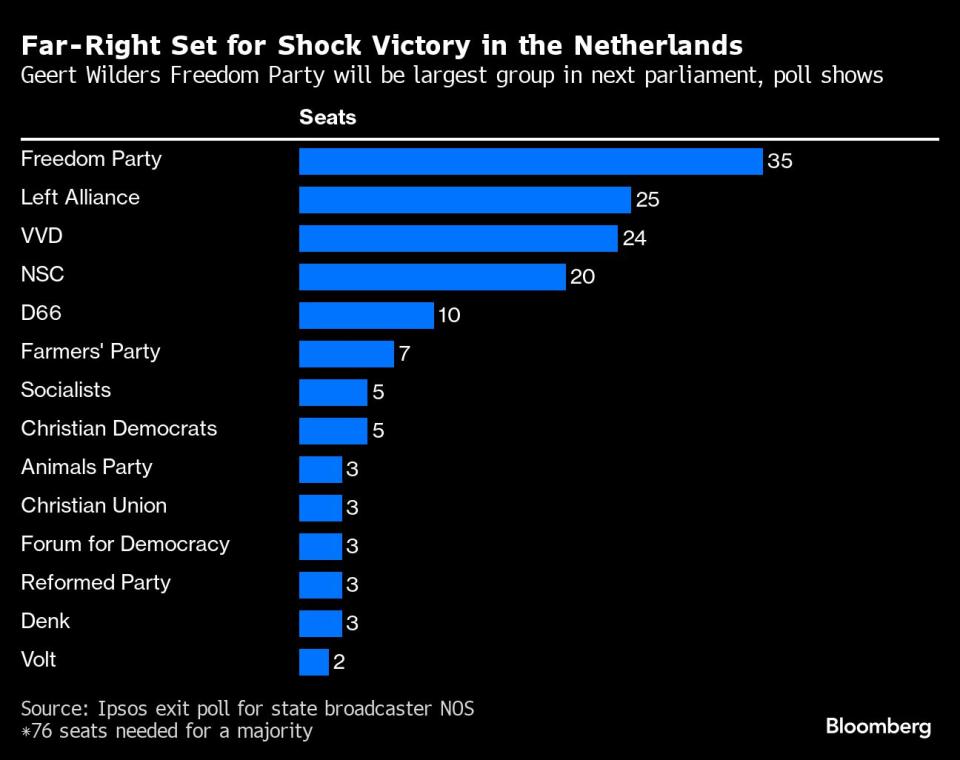Dutch Far-Right Leader Wilders Scores Shock Election Victory
- Oops!Something went wrong.Please try again later.
- Oops!Something went wrong.Please try again later.
(Bloomberg) -- Far-right lawmaker Geert Wilders won the Dutch elections and said he plans to lead the country’s next government, after a late surge in the final days of the campaign catapulted his anti-EU party past his mainstream rivals.
Most Read from Bloomberg
OpenAI Engineers Earning $800,000 a Year Turn Rare Skillset Into Leverage
Hulu for $1, Max for $3: Streaming Services Slash Prices This Black Friday
McKinsey and Its Peers Are Facing the Wildest Headwinds in Years
Wilders’s Freedom Party is projected to win 35 seats, more than doubling his representation from the previous parliament, according to an exit poll from public broadcaster NOS. With that number substantially less than the 76 required to secure an outright majority, he will still need to find partners to join him in a governing coalition.
If the projections are accurate, Wilders’s prospects of leading the next government will hinge on his ability to forge alliances with rivals further to the center. In his speech after the results Wilders called for a coalition that would include outgoing premier Mark Rutte’s VVD, which has indicated that it might be prepared to govern alongside him.
“The hope of the Dutch people is that they will get their country back,” Wilders said in a speech after his election victory, adding, “I am willing to compromise in talks with other parties.”
The victory comes after a campaign that highlighted a growing opposition to immigration in the Netherlands. The 60-year-old is known for his anti-Islamic views and has lived under police protection for two decades on account of death threats.
Wilders and his team hugged and cheered as the result was announced and sang along to the Rocky theme tune Eye of the Tiger. Reporters who watched his campaign team celebrate at a crowded bar in Scheveningen near The Hague did so from behind security glass.
Wilders has promised a binding referendum on leaving the European Union. Hungarian Prime Minister Viktor Orban was quick to congratulate him on his victory on the micro-blogging site X.
The controversial politician benefited from strong showing in the campaign’s final election debates — and from the refusal of Rutte’s successor as party leader, Dilan Yesilgoz-Zegerius, to rule out working with him. Yesilgoz-Zegerius signaled before the election that she might go into coalition with Wilders, and after the exit polls gave a speech conceding that it was “not up to the Liberals to take the lead now,” referring to her own VVD Party.
Despite campaign pledges on banning the Koran and shutting down mosques, “Geert Wilders conveyed a more moderate message than in previous years,” said Stefan Couperus, an associate professor of political science at Groningen University. “That seems to have worked electorally.”
The Left alliance led by Frans Timmermans looked set to come second with 25 seats, while a new party formed by lawmaker Pieter Omtzigt is projected to get 20 seats, NOS said.
“The PVV cannot be ignored, and wants to work together with other parties, and that means that we and they have to step over their shadow,” Wilders said.
If Wilders ends up leading the next government, it would elevate a euroskeptic into the heart of one of the union’s stalwart members. He has called for the Netherlands to withdraw from its international climate obligations. Anti-migration sentiment of the kind Wilders has long-championed was a prominent issue on the campaign trail.
Wilders has been a member of parliament for 25 years but only once taken part in government, between 2010 and 2012 when he had an arrangement to support Rutte’s first, minority coalition from outside. Rutte later ruled out working with him, after Wilders made comments insulting people of Moroccan descent for which he was censured by the courts.
It’s likely that the outgoing caretaker government led by Rutte could preside for a while, especially if Wilders’s strong showing complicates the coalition-building process. At the last election, four parties were needed to broker a majority government and the negotiations took a record nine months.
--With assistance from April Roach and Sarah Jacob.
(Updates with details throughout.)
Most Read from Bloomberg Businessweek
How Elon Musk Spent Three Years Falling Down a Red-Pilled Rabbit Hole
More Americans on Ozempic Means Smaller Plates at Thanksgiving
Guatemalan Town Invests Remittance Dollars to Deter Migration
©2023 Bloomberg L.P.



